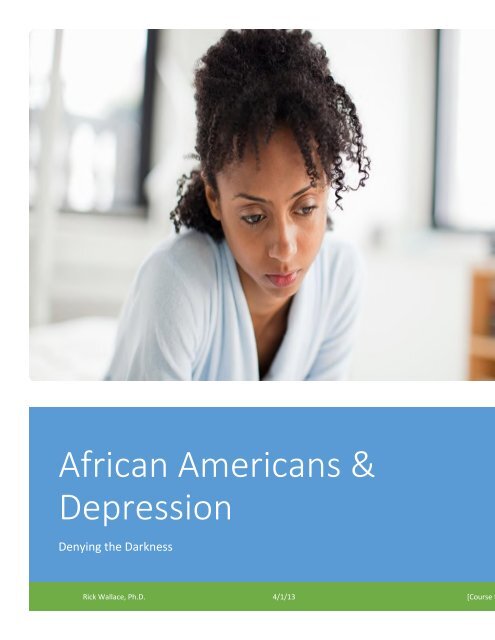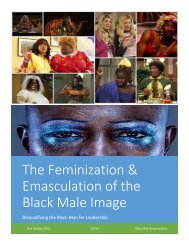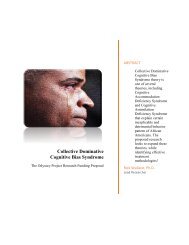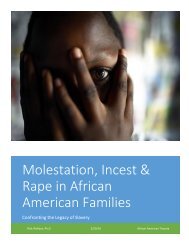African Americans & Depression: Denying the Darkness
One of the primary symptoms associated with the trauma of incest and child molestation is depression, and much in the same way that blacks go to great lengths to pretend that incest is not an issue of relevance among us, we emphatically deny the impact that depression, as a mental disorder, is having on us as a collective.
One of the primary symptoms associated with the trauma of incest and child molestation is depression, and much in the same way that blacks go to great lengths to pretend that incest is not an issue of relevance among us, we emphatically deny the impact that depression, as a mental disorder, is having on us as a collective.
Create successful ePaper yourself
Turn your PDF publications into a flip-book with our unique Google optimized e-Paper software.
<strong>African</strong> <strong>Americans</strong> &<br />
<strong>Depression</strong><br />
<strong>Denying</strong> <strong>the</strong> <strong>Darkness</strong><br />
Rick Wallace, Ph.D. 4/1/13 [Course t
<strong>African</strong> <strong>Americans</strong> & <strong>Depression</strong>:<br />
<strong>Denying</strong> <strong>the</strong> <strong>Darkness</strong><br />
By<br />
Dr. Rick Wallace, Ph.D.<br />
Copyright © 2016 by Rick Wallace<br />
All rights reserved.
Introduction<br />
Several days ago I published a paper entitled, “Molestation, Incest and Rape in <strong>African</strong><br />
American Families,” I spoke of this devastating plague in <strong>the</strong> <strong>African</strong> American community as<br />
<strong>the</strong> elephant in <strong>the</strong> room — a plague that is wreaking havoc at astronomical levels. Well, one of<br />
<strong>the</strong> problems with attempting to address <strong>the</strong> troubled plight of <strong>African</strong> <strong>Americans</strong> is <strong>the</strong> fact that<br />
<strong>the</strong> enigmatic issues that serve to subdue our efforts of universal elevation are multitudinous.<br />
One of <strong>the</strong> primary symptoms associated with <strong>the</strong> trauma of incest and child molestation is<br />
depression, and much in <strong>the</strong> same way that blacks go to great lengths to pretend that incest is not<br />
an issue of relevance among us, we emphatically deny <strong>the</strong> impact that depression, as a mental<br />
disorder, is having on us as a collective.<br />
The Stigma of <strong>Depression</strong> Among <strong>African</strong> <strong>Americans</strong><br />
Much of <strong>the</strong> denial surrounding depression is a direct response to <strong>the</strong> negative stigma associated<br />
with it and o<strong>the</strong>r mental disorders, such as bi-polar disorder (formerly known as manic<br />
depressive disorder) (Staff E. , 2016). Blacks seem to have an almost inherent belief that<br />
admission to experiencing any symptoms associated with depression is an admission of<br />
weakness or faithlessness (Staff M. , 2016). While much of <strong>the</strong> psycho<strong>the</strong>rapeutic community<br />
has attempted to create an inclusive treatment environment, <strong>the</strong>ir efforts can only be viewed as a<br />
failure as far as people of color are concerned. It is estimated that only one-third of <strong>African</strong><br />
American people who are victimized by some form of mental psychosis will seek professional<br />
help (Staff, 2014).<br />
A Marked Increase in Suicide Among Black Youth<br />
One thing that is saddening is <strong>the</strong> fact that <strong>the</strong>re is an alarming increase in suicide rates among<br />
<strong>African</strong> <strong>Americans</strong> that no one wants to talk about. To exacerbate <strong>the</strong> matter, <strong>the</strong> rate of suicide<br />
among <strong>African</strong> American teens is on <strong>the</strong> rise (Joe, 2009). While suicide among <strong>African</strong><br />
American girls has been an issue for some time, <strong>the</strong>re has been a significant increase in <strong>the</strong><br />
number of suicides of <strong>African</strong> American boys (Storrs, 2015). Unfortunately, <strong>the</strong> stigma<br />
associated with depression often leaves <strong>the</strong>se young <strong>African</strong> American children to suffer in<br />
silence, based on <strong>the</strong> belief that no one will understand.<br />
Something that is alarming is <strong>the</strong> fact that while blacks sit around pretending that we don’t have<br />
a problem, <strong>the</strong> suicide rate among <strong>African</strong> American youth has more than doubled over <strong>the</strong> last<br />
20 years — surpassing <strong>the</strong> rates among white children, which actually dropped during this same<br />
period (Storrs, 2015).<br />
While suicide among Black teens is always a concern, simply based on <strong>the</strong> stresses and<br />
challenges associated with <strong>the</strong> transition from childhood to adulthood, what is frightening is <strong>the</strong><br />
rapid rise in <strong>the</strong> suicide rate among black children between <strong>the</strong> ages of 5-11. When it comes to<br />
<strong>the</strong> suicide rate of this age group, <strong>the</strong> overall rate remained steady, but <strong>the</strong> rate of suicide among<br />
black boys in this same age group nearly doubled from almost 18,000 per one million to 34,700<br />
per one million (Storrs, 2015).
The problem with <strong>the</strong> rise in suicide rates is that, outside of <strong>the</strong> world of science, <strong>the</strong>re is not true<br />
effort to understand <strong>the</strong> etiology that is fueling this increase. It has long been <strong>the</strong> common<br />
response of blacks that contemporary black youth lack <strong>the</strong> toughness and resilience that <strong>the</strong><br />
generation before <strong>the</strong>m possessed. Children who suffer from depression are considered weak,<br />
and often <strong>the</strong>y are mistreated and abused in attempts to “toughen” <strong>the</strong>m up. Attempting to<br />
toughen up a victim of depression can be met with dire consequences.<br />
Not only have I counseled parents who have lost children to suicide, but I personally have<br />
several close friends who have lost a child to suicide.<br />
We are in Denial<br />
It is also important to understand that while we are talking primarily about black youth to this<br />
point, depression and suicide among blacks, in general, has become an increasing problem (Staff<br />
M. , 2016; Staff E. , 2016). In fact, <strong>the</strong>re has been a significant increase in suicides among black<br />
males (Storrs, 2015).<br />
The recent death of Sandra Bland while in custody in a Texas jail sparked national interest and a<br />
demand for justice. While being 100 percent in favor of seeking justice for Sandra, <strong>the</strong> researcher<br />
in me, could not help but study <strong>the</strong> response of <strong>the</strong> black community to <strong>the</strong> official cause of<br />
death being listed as suicide. The view of <strong>the</strong> vast majority of <strong>African</strong> <strong>Americans</strong> who voiced<br />
<strong>the</strong>ir opinions insisted that it was not even possible for Sandra took her own life, even after <strong>the</strong><br />
independent autopsy ordered by her family came to <strong>the</strong> same conclusion — death by<br />
asphyxiation, as a result of suicide.<br />
The postulations that Sandra Bland did not kill herself were not based on an understanding of<br />
psychology, depression nor suicidal ideation, but on a primary belief that black people who<br />
appear happy or even defiant could not possibly be suicidal. In all fairness, <strong>the</strong>se postulations<br />
were also driven by an additional force, <strong>the</strong> distrust for law enforcement. It was just easier to<br />
believe that she was murdered than to face <strong>the</strong> possibility that she may have taken her own life.<br />
Am I suggesting that Sandra Bland took her life? Not with certainty. There are simply too many<br />
variables that cannot be effectively examined at a distance, and my distrust of law enforcement<br />
carries immense gravity. However, here is what I can share. I did not rely solely on <strong>the</strong> reports of<br />
social media. I decided to conduct my own forensic psychological examination with <strong>the</strong><br />
information that was being made public record. I will first admit that consideration has to be<br />
given to <strong>the</strong> fact that law enforcement is not going to leak information that would be detrimental<br />
to <strong>the</strong>m, so <strong>the</strong> information that I had access to had to be examined under <strong>the</strong> scrutiny of<br />
suspicion. One of <strong>the</strong> most telling pieces of evidence was a recording of Sandra’s last phone call,<br />
which went out to a friend that she was trying to reach. She ended up leaving a voicemail, and<br />
<strong>the</strong> tone in this voicemail spoke volumes.<br />
I also evaluated <strong>the</strong> activities that transpired from <strong>the</strong> time that she was arrested until her body<br />
was wheeled out of her cell. Her body language on videos, and her voice on phone calls, reveal a<br />
decline state of mind — she had gone from defiant to despondent. I also visited her page and<br />
went through it fastidiously. What I can say with a certain level of certainty is that she suffered
from depression, and that much of that suffering took place in silence and loneliness. That<br />
loneliness was intensified during her stay in jail, as friend after friend failed to come through for<br />
her.<br />
What I can also say is that <strong>the</strong> jail, and its personnel, still carry some level of culpability in her<br />
death, simply because she admitted that she not only suffered from depression, but she also<br />
admitted that she had attempted suicide in <strong>the</strong> past. She should have been placed on a suicide<br />
watch, which should not have been that difficult, considering <strong>the</strong> size of that jail. At <strong>the</strong> very<br />
least, anything that she could have harmed herself with should have been removed from her cell.<br />
Why am I speaking about such a sensitive topic as <strong>the</strong> death of Sandra Bland? It is because <strong>the</strong><br />
rampant denial of blacks concerning depression makes us more vulnerable to <strong>the</strong> pestilential<br />
mechanisms of <strong>the</strong> disease. Instead of dismissing <strong>the</strong> rise in suicides among blacks as a form of<br />
weakness, we must learn to ask why. Everything has a cause, and ignoring or dismissing <strong>the</strong> act<br />
does not extirpate <strong>the</strong> consequence.<br />
We must take <strong>the</strong> time to understand and confront depression, if we expect to successfully<br />
overcome it. We cannot ignore or dismiss this condition into obscurity, we are going to have to<br />
confront it, or we will continue to see a rise in <strong>the</strong> rate of suicide. While suicide has been a<br />
topical focus thus far, it is worth noting that not all bouts with depression will produce suicidal<br />
ideations; however, <strong>the</strong> numbers do reveal that suicidal ideation is prevalent among certain<br />
groups, especially teens.<br />
Understanding <strong>the</strong> Basic Function of <strong>Depression</strong><br />
Despite common belief, clinical depression is more than <strong>the</strong> result of <strong>the</strong> weight of life’s ups and<br />
downs. Everyone experiences being mentally depressed at some point in life, after all, life is<br />
replete with moments of happiness, sadness, loss, accomplishment and more, and it is reasonable<br />
to assume that a person’s state of mind may vacillate based on <strong>the</strong> fluctuation of <strong>the</strong>se different<br />
realities. However, clinical depression is more emphatic in its impact and duration. It can<br />
manifest itself as chronic or recurring, and it can be absolutely unforgiving.<br />
Clinical depression should not be viewed as a personal weakness, gracelessness or faithlessness.<br />
It is actually a common and very serious medical condition. Clinical depression is a condition<br />
that impacts <strong>the</strong> entire being of a person, including mood, body, thoughts and behavior. Without<br />
seeking <strong>the</strong> appropriate treatment, <strong>the</strong> symptoms can last for weeks, months or even years.<br />
Fortunately, most cases of depression, even severe cases, can be successfully treated.<br />
Myths Surrounding <strong>Depression</strong><br />
Unfortunately, <strong>the</strong> myths associated with depression place a stigma on <strong>the</strong> condition that creates<br />
unnecessary confusion and pain — and it keeps people from seeking <strong>the</strong> necessary support and<br />
help <strong>the</strong>y need to improve. The following statements reflect just some of <strong>the</strong> misconceptions<br />
associated with depression. “Why are you depressed, just get over it?” “If our people can survive<br />
slavery, we can make it through anything.” When a black woman suffers with depression, she is<br />
considered to be weak, and weakness is something that is not tolerated in black women.” “You
should take your troubles to Jesus, not some stranger (or <strong>the</strong> ever famous “Jesus will fix it”).”<br />
The last statement is not to insult <strong>the</strong> faith of some, but it is to highlight <strong>the</strong> need for blacks to see<br />
<strong>the</strong> severity of this condition and treat it accordingly. No one would look at a person who is<br />
apparently experiencing a heart attack or suffering from severe head trauma and say, “give it to<br />
Jesus.” These people would be immediately rushed to a trauma center for treatment. This is <strong>the</strong><br />
same approach that must be taken with depression.<br />
Recognizing <strong>the</strong> Signs and Symptoms of <strong>Depression</strong><br />
Studies have proven that culture can affect <strong>the</strong> manner in which a person suffering with<br />
depression will exhibit <strong>the</strong>ir symptoms. One of <strong>the</strong> most common things I hear from <strong>the</strong> family<br />
and friends of victims of suicide who my counsel, is that <strong>the</strong>y had no idea, <strong>the</strong>y did not notice<br />
any signs or symptoms of depression or suicidal ideation. Following are a number of signs and<br />
symptoms that are associated with depression that you should be aware of.<br />
<br />
<br />
<br />
<br />
<br />
<br />
<br />
<br />
<br />
Reduced appetite and unexplained weight loss, or conversely, an inexplicable increase in<br />
appetite and weight gain<br />
A mood of sadness, anxiety or emptiness that is persistent<br />
Physical symptoms that are persistent and don’t respond to treatment, including<br />
headaches, digestive disorders and chronic pain<br />
A decrease in energy levels, fatigue or feeling bogged down<br />
Ei<strong>the</strong>r, sleeping too much or too little, early morning waking or difficulty falling to sleep<br />
Uncontrollable feelings of guilt, helplessness, worthlessness, pessimism and hopelessness<br />
Difficulty in concentrating or remained focused on tasks and responsibilities<br />
Loss of interest of pleasure in activities once considered a passion<br />
Suicidal ideation or suicidal attempts<br />
Treatment Options<br />
One of <strong>the</strong> most common responses to clinical depression is psychopharmacological<br />
intervention; however, I personally prefer to use drug intervention as an emergency or final<br />
resort. The option I prefer to use is some form of psycho<strong>the</strong>rapy that identifies core issues, while<br />
providing coping mechanisms that will allow <strong>the</strong> individual to handle negative situations better.<br />
Therapy can definitely be a viable and efficacious option, especially with less severe cases. I am<br />
also currently working on a diet that will help raise serotonin and dopamine levels, which can be<br />
very beneficial in treating depression.<br />
What is important here is to understand that depression is real, and pretending that it does not<br />
exist, or that those who openly suffer with it are weak or faithless, is not <strong>the</strong> way to successfully<br />
confront this growing epidemic. We must treat it as we treat any o<strong>the</strong>r potentially life threatening<br />
condition. We must be proactive in engaging it. We must educate our communities in order to<br />
remove <strong>the</strong> stigma that is currently associated with this condition. Most of all, we cannot allow<br />
our loved ones to suffer in silence.
By<br />
Dr. Rick Wallace, Ph.D.<br />
Related topics:<br />
1. The Mis-education of Black Youth in America<br />
2. Molestation, Incest and Rape in <strong>African</strong> American Families<br />
3. Racial Trauma & <strong>African</strong> <strong>Americans</strong>
Bibliography<br />
Joe, S. (2009). Black Teens, Especially Girls, at High Risk for Suicide Attempts. National<br />
Institute of Mental Health.<br />
Staff, E. (2016). <strong>Depression</strong> and <strong>African</strong> <strong>Americans</strong>. Mental Health America.<br />
Staff, M. (2016). <strong>African</strong> American Mental Health. National Association on Mental Health.<br />
Staff, P. (2014). Breaking <strong>the</strong> Taboo of <strong>Depression</strong> Among <strong>African</strong> American Men. Lucidia .<br />
Storrs, C. (2015). Suicide Rates Among Young Black Boys on <strong>the</strong> Rise. CNN Health Journal.

















